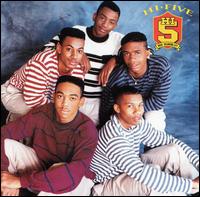Ok, enough about band names. That’s what I thought to myself after I posted my second installment last week about youthful musicians who get into trademark trouble when they select a name for their band without making sure no one else has already adopted it. But when a lawsuit about a band’s name is filed right in my own backyard, I couldn’t help myself.
On February 26, Seattle-based Amazon.com filed suit in the Western District against musicians Treston Irby, Russel Neal and Marcus Sanders. Those persons, along with Tony Thompson and Roderick Clark, toured and recorded under the name “Hi-Five” from approximately 1990 to 1997. In the late 1990’s, the band broke up for good and Mr. Thompson formed a new band with other members that he also called “Hi-Five.”
 In 2005, three members of the old “Hi-Five” sued Mr. Thompson and the other members of the new “Hi-Five” in the Southern District of New York, alleging various forms of trademark infringement. The three old “Hi-Five” members also named Amazon.com in the suit on the theory that Amazon.com had infringed the HI-FIVE name and mark by selling HI-FIVE-branded CDs released by the new “Hi-Five” members. In 2006, Amazon.com allegedly paid each $1,000, obtained a release, and was dismissed from the suit with prejudice.
In 2005, three members of the old “Hi-Five” sued Mr. Thompson and the other members of the new “Hi-Five” in the Southern District of New York, alleging various forms of trademark infringement. The three old “Hi-Five” members also named Amazon.com in the suit on the theory that Amazon.com had infringed the HI-FIVE name and mark by selling HI-FIVE-branded CDs released by the new “Hi-Five” members. In 2006, Amazon.com allegedly paid each $1,000, obtained a release, and was dismissed from the suit with prejudice.
Thereafter, the three old “Hi-Five” members apparently learned that Amazon.com was again selling an album produced by the new “Hi-Five” under the HI-FIVE name and mark, to which the three old “Hi-Five” members objected. Amazon.com claims the CDs in question were being marketed through its “Marketplace” program by third-party sellers with whom Amazon.com had no connection or control. Amazon.com also claims when it learned the allegedly infringing CDs were being sold, it removed those items from its website. Amazon.com alleges the three old “Hi-Five” members nonetheless sent Amazon.com a letter demanding “payment of $100,000, presumably in exchange for a second release or settlement….”
In response, Amazon.com filed suit against the three old “Hi-Five” members seeking a declaratory judgment that it owes them nothing more than it has already paid.
Two lawsuits in two years is a lot of litigation for a band. Would either of these suits have been filed if only Mr. Thompson had identified his new group with a new name?